
Fundy Stamp Collectors Club
P. O. Box 302
Moncton N.B.
E1C 8L4
Since 1997

 |
|
 |
The Philatelic Corner
By Paul-Emile Bourque
Moncton, NB

|
Although my selection for this article is a rather
recent edition, I believe that it will become a
classic in time. Indeed, Douglas Murray's book
entitled The Post Office on Prince Edward
Island (1787-1990) is a choice reference source
for the BNA collector. The book offers first hand a glimpse of the postal history of P.E.I. and then presents a list of all the post offices that have existed in P.E.I. from 1787 to 1990. The listings are presented in three formats: alphabetically, geographically and chronologically which make finding the post offices much easier. The listing for each post office presents the official name, the P.E.I. lot number where the office is located, the county, and the opening and closing dates. Many hours of research were spent in the Public Archives of P.E.I., the Public Archives of Canada and the National Postal Archives by Doug Murray in compiling this list. His keen interest and knowledge on P.E.I. postal history transpires throughout the book. Truly, P.E.I. is fortunate to have one of its own philatelists documenting its postal history. He successfully arose to the calling and to the challenge of the world philately and has contributed significantly to expanding our knowledge of P.E.I. postal history. Thus for all BNA collectors, this book is a very precious source of information and a must have. However, please note that it is a limited edition, so if you come across a copy, don't hesitate to purchase it because you may not find another one easily.
|
|
I have to start this 22nd edition of The
Fundy Stamp Club News with an apology
to my fellow club members over
misidentifying the New Brunswick stamp
that was used as the source for our new
club logo. It is the combination of the New
Brunswick steamship stamp (Scott # 10)
with the capital "F" for the Fundy Stamp
Collectors Club that designer Jim Hudson
so carefully crafted into the new club logo. The Fundy Stamp Collectors Club held regular meetings monthly on the first Thursday night, 7:00 - 9:OOpm at the CN Pensioners Club on Curry St. in Moncton. Attendahce has averaged 10 members. A short business meeting is followed by a presentation or one-page exhibit by various members. The BRUNPEX08 show held in Moncton on September 20, 2008 was reported to be quite successful, although attendance was lower than expected. The facility - the Moncton Rotary Lodge - received many favorable comments, and has been booked again for the 2009 edition. Due to some scheduling conflicts, a revised date has been established, and BRUNPEX09 will be held on Saturday, September 12, 10:00am to 4:00pm.
|

|
Don Mills, editor
e-mail: donmillscanada@yahoo.com
| Recently I came across a series of postage stamps produced by La Poste (the French postal service) to celebrate Valentine's Day. Each year since 2000 a renowned fashion designer has been selected to provide the designs. In most cases, the design is a perforated heart- shaped stamp within a rectangular border. |
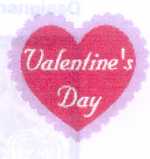
|
| The inaugural designs were submitted by Yves Saint- Laurent, and included two 3-franc stamps (0,46 euros), a souvenir sheet of 5, and a booklet of ten self- adhesive stamps. In 2001 Christian Lacroix designed one 3-franc (0,46 euros) stamp, as well as a beautiful souvenir sheet of 5. These issues were all denominated in both euros and francs. |
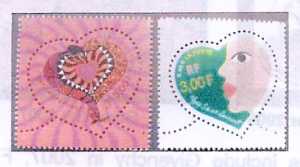 Yves Saint Laurent 2000 |
| La Poste veered from the fashion designers in 2002, using instead designs from photographs by Yann-Arthur Bertrand. The use of fashion designers returned in 2003, with the Torrente fashion house receiving the job. A 0,46 euro and a 0,69 euro stamp were produced, and another beautiful souvenir sheet of 5. These were followed by Chanel in 2004, designed by Karl Lagerfeld, Cacherel in 2005 (0,53 and 0,82 euros), and Jean-Louis Scherrer in 2006. Each year two stamps and a souvenir sheet of 5 were produced, as well as peel-and-stick booklets. |
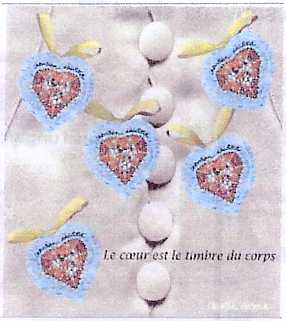 Christain Lacroix S S 2001 |
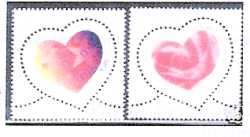 Yan Arthur Bertrand 2002 |
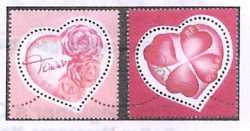 Torrente Fashion House |
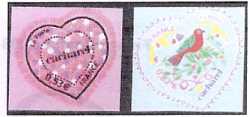 Cacherel 2005 |
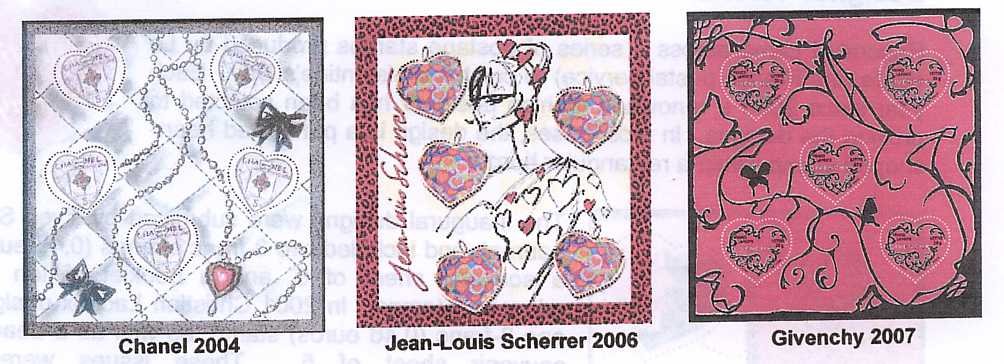
Recent additions to the fashion designer series include Givenchy in 2007, Franck Sorbier in 2008, and Emanuel Ungaro in 2009. The issues from these two years are NVI (no value indicated), but are marked "Lettre prioritaire". The trend is continued with two stamps, two self-adhesive stamps, and a five-stamp souvenir sheet.
SOAKING STAMPS OFF PAPER
The correct way to remove used stamps is to soak them off in water, and then to dry them on a flat dry surface (preferably a paper towel). There is too much to the art of soaking to tell you here, but much more can be found in any basic reference work on stamp collecting. Soaking stamps with the new "invisible" gum can be very difficult, however, because they tend to retain gum even after being soaked off original paper, and will stick fast to paper on which they are dried. One answer is to dry them face down, with nothing touching the backside, then flatten them out later if they curl. Most other types of gum just soak off in water, and present no problems.
Watch out because anyone can easily ruin hundreds of good stamps by soaking stamps with magenta, red, or purple cancels (such as those used on registered mail) in the same bowl with others, because after a few minutes these cancellation inks usually start to run, and stain everything. Separate these out first, soak them separately, use cold water only, and try to trim off every bit of the colored cancel you can from the surrounding paper. Then be prepared to take them out of the water immediately as stamps separate from backing paper.
Some stamps should not be soaked without consulting a more knowledgeable philatelist. Anything on an original cover that is more then 20 or 30 years old might be worth saving. Also, don't soak it if the cover looks "philatelic" somehow -- has a special fancy cancel or was postmarked for a special event, etc. When in doubt, wait before you soak because First Day Covers, envelopes with a special design of a stamp and postmarked on its issue date, can be worth many times the value of the stamp on it.
Next time: "Drying Stamps"